Whenever Kate and Jamie Scott’s seven-year-old son writes a card for his daddy, it contains the same fervent wish.
‘He always says ‘I hope you feel better soon, daddy’, because he doesn’t understand that you can’t get better from a brain injury the size of a credit card,’ says Kate.
The bewilderment of her eldest boy and his four-year-old brother is ‘another layer of heartbreak’, as 36-year-old Kate puts it, on top of everything she and her husband have already endured – and they have endured a great deal.
Three years ago in April, Jamie suffered a catastrophic bleed on the brain after being given the AstraZeneca Covid vaccine.
Doctors were convinced it was a death sentence but, astonishingly, the previously fit and athletic then 44-year-old – a keen skier, mountain biker and runner – pulled through. A ‘walking miracle’, in Kate’s words.
He is far from the same man, however. His vision is impaired, he can no longer hold down his high-flying software engineer job, drive a car, or follow complex conversations.
The toll it has taken on the family has required a huge amount of adjustment. To make matters worse, it has been unfolding against a backdrop in which the Scotts – and the dozens of others like them who have lost loved ones or watched them battle grievous consequences following an adverse reaction to the Covid vaccine – feel they have been silenced.
‘I have had people stop talking to me and walk away when I describe what happened to Jamie,’ Kate says. ‘If I said he’d had a bike accident, I think people would always say how sorry they were. But with this, people either question whether it’s true or just don’t want to talk about it. It’s such a taboo subject; our circle of family and friends is much smaller because of it, which has been hard to come to terms with. It’s the same for many in our position. We’ve been made to feel like an uncomfortable truth.’
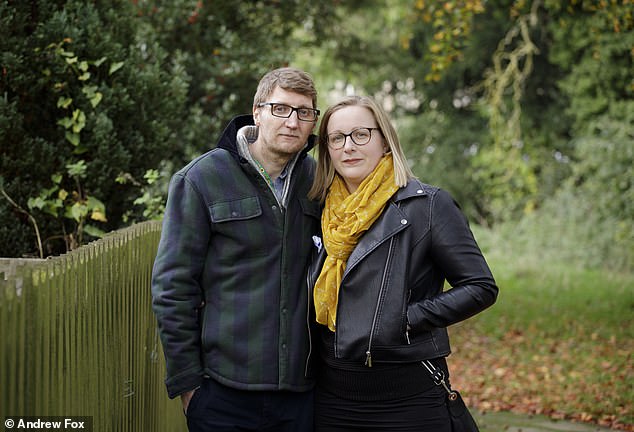
Jamie Scott with his wife Kate. Jamie suffered a catastrophic bleed on the brain after being given the AstraZeneca Covid vaccine
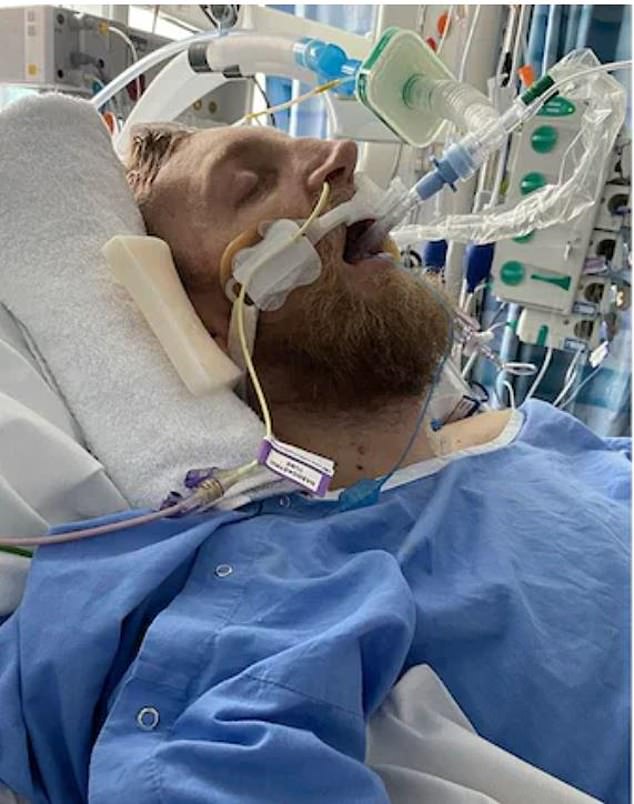
Jamie Scott had to fight for his life after receiving the vaccine
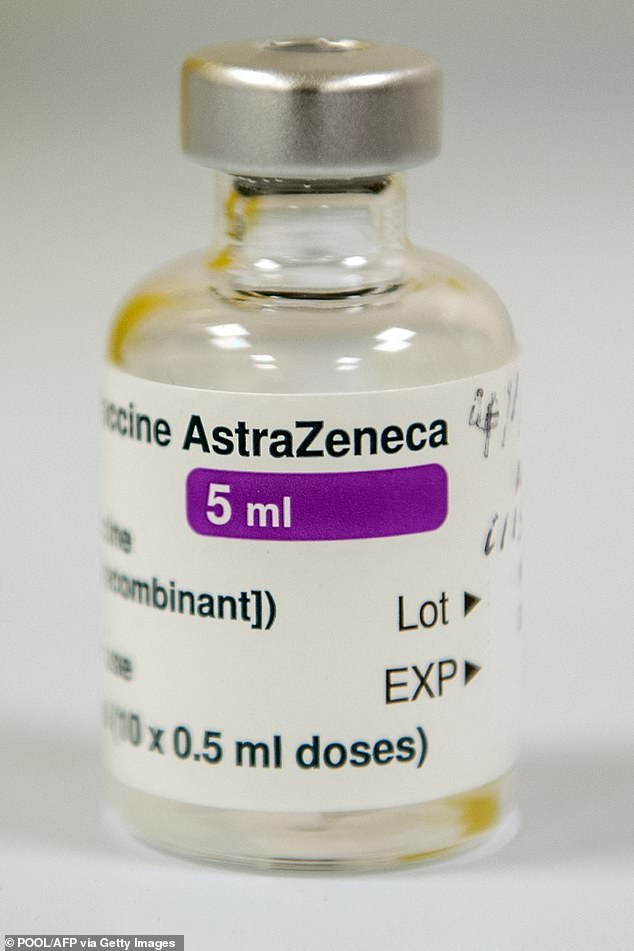
A vial of the AstraZeneca/Oxford Covid-19 vaccine is pictured at the Lochee Health Centre in Dundee on January 4, 2021
Equally difficult to navigate, she says, is the Government’s compensation scheme (known as the Vaccine Damage Payment Scheme, or VDPS), currently limited to a payout of just £120,000 – and even then, only when those affected have gone through a draconian process in which they are judged on whether they meet ‘the threshold’ for payment, a brutally specific figure of ’60 per cent or more disabled’.
The severity of Jamie’s condition means that he easily met that criteria – a bittersweet moment for Kate, who says she ‘cried and cried’ when receiving the news over the phone.
‘Because now it’s been confirmed in black and white that the vaccine caused his injury, and he’s 60 per cent disabled, and that is our ‘win’. But it’s not a win, is it? That’s our life now. And £120,000 doesn’t touch the sides of what we have lost in terms of income, and will lose over the decades to come.’
It is one reason that Kate has fought so passionately for the voices of vaccine victims to be heard at the ongoing Covid-19 Inquiry, a desire which was fulfilled last week when, on Wednesday, she gave evidence for half an hour on their behalf.
‘It’s not even enough time to tell my story, never mind do justice to others, but it’s all I have,’ she told me as we speak before she enters the witness box, where she went on to talk with dignity about her experience and that of other families.
Naturally intensely private, Kate has struggled to cope with juggling her grief and becoming a campaigner and spokeswoman. Yet she feels she has no choice but to step into the limelight to make the case on behalf of vaccine-damaged families.
‘At the inquiry the lead counsel said it is accepted that with any medicine, including vaccines, there’s injury and death,’ she says. ‘But after what we’ve been through, the question is, how many is unacceptable? Because we know that 13,000 people have applied for the compensation scheme, and we know that 250,000 have reported an adverse reaction. So at what point does it tip over to becoming unacceptable? And if it is acceptable, why is it not accepted that there should be a fair and adequate compensation scheme?’
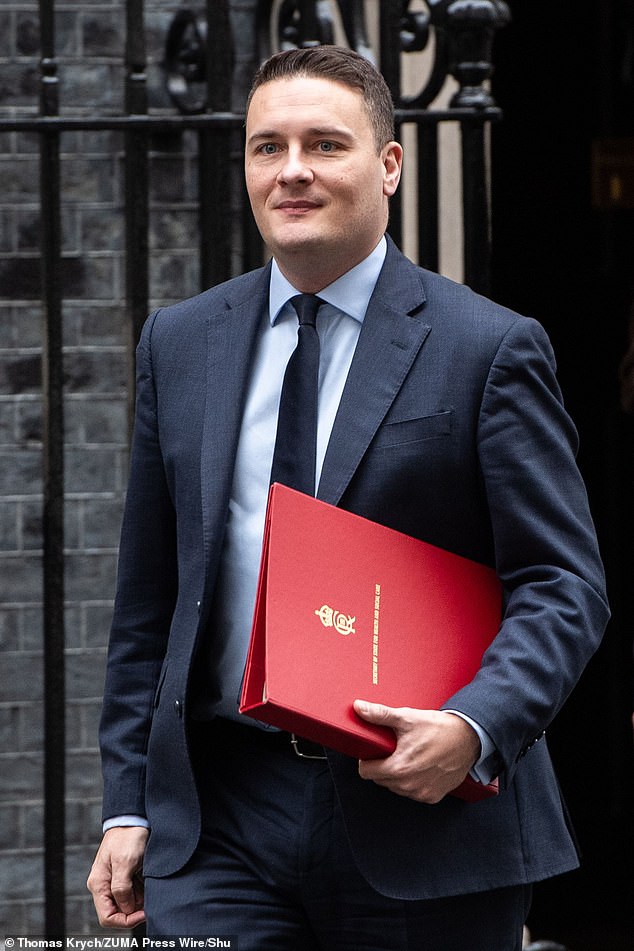
Kate Scott has met with Health Secretary Wes Streeting (pictured), who has since written to Kate informing her he has commissioned officials to look into options to reform the current compensation scheme and ‘potential legislative change’
These are big questions, and ones Kate would never once have expected to ask – although, as she says, that is partly the point.
‘What happened to Jamie could have, and has, happened to anyone,’ she says.
Kate met Jamie ten years ago when, as a business studies student on a sandwich course year, she moved into the professional house share in Reading where Jamie was living.
‘I had the smallest room. He had the room with the en suite, so that was me sold,’ she smiles. James was 12 years her senior, but they ‘clicked’ straight away. ‘Friends used to take the mickey out of how happy we were,’ she says. ‘We were always laughing.’
They travelled together and lived in Australia before returning to the UK, settling in the West Midlands. Their eldest son was a honeymoon baby. ‘We went from a fantastic wedding to a family and our first house together,’ Kate says.
An active, fit 40-something, James was rarely ill.
‘He didn’t take any medicine, never took any sick days from work. He had a very high stress job, but was just cool as a cucumber and calm with it all the time.’
When Covid hit, like many, Jamie’s thoughts first turned not to himself but his elderly father and, in April 2021, he went to his local GP clinic for his jab.
‘He didn’t need it for himself, like most of us he did what he thought was the right thing. He thought it was safe and effective and would protect others,’ Kate says.
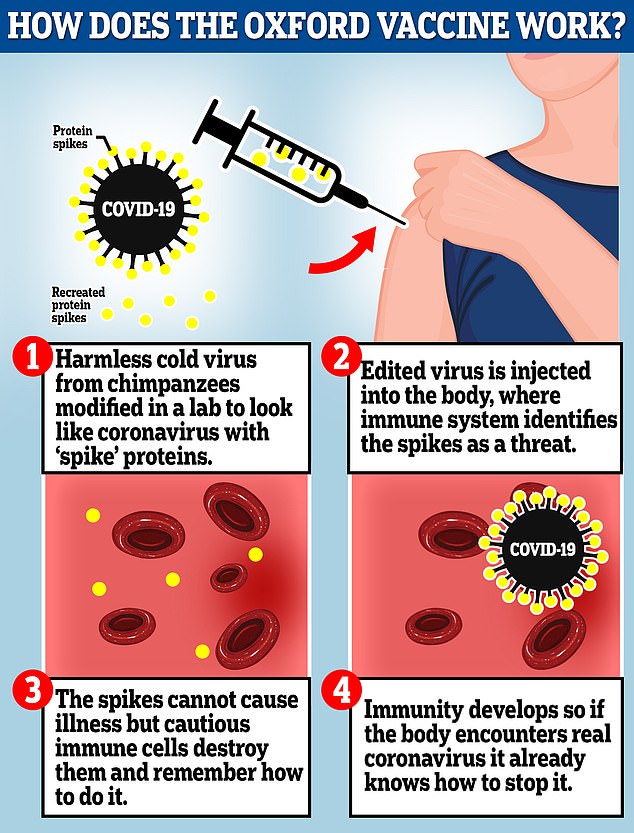
At the time, the Government was promoting the AstraZeneca vaccine, developed at the University of Oxford, which earlier that month the European Medicine’s Agency had concluded came with the ‘rare side effect’ of unusual blood clots. ‘Jamie had read something about it somewhere and did ask for the Pfizer vaccine, but he was told they didn’t have any and he would be fine,’ says Kate. ‘He didn’t get any patient information.’
Busy family and professional life went on as normal – until ten days later James awoke complaining of tiredness. ‘I remember being a bit annoyed with him, as it was meant to be my turn to have a lie-in,’ she says.
Within an hour, however, it was obvious something was deeply wrong: James started retching and could no longer speak. ‘The sounds he was making is something I’ll never forget,’ she says. Kate called an ambulance, and Jamie was taken to a small local hospital where, in an astonishing fluke, medics had been issued with a diagnostic chart for vaccine-related illness, and quickly suspected Vaccine-induced immune thrombocytopenia and thrombosis (VITT).
‘It saved his life,’ she says. ‘I think if he had gone to one of the bigger hospitals he would have been left for a while, but at our local hospital the communication had come through, whoever was on that day had seen it and, within 15 minutes, he was blue lighted to University Hospital Coventry, where he was able to start treatment. By this time he was non-communicative.
‘In my opinion, everyone who presented with new injuries in hospital should have been asked: ‘Did you have the vaccine recently?’ And it was a question that wasn’t, in many cases, allowed to be asked. Thank God it was for Jamie.’
Within hours, Jamie was moved again, this time to Birmingham’s Queen Elizabeth Hospital, where surgeons battled to save his life from what proved to be a catastrophic bleed on the brain.
The surgery was a success, but Jamie was still at death’s door: on three occasions, Kate was called in to say her goodbyes at his bedside, one of the few times she was actually allowed to see him because of Covid restrictions in place at the time.
He was in a coma for five weeks, and Kate was warned he might never walk or talk again and that he might have lost his memory.
‘The doctors thought he might not remember our youngest because he was only a few months old when it happened, but when Jamie woke up he looked at a photo of him and just cried. He’d remembered us and it was amazing.’
On returning home four months later after extensive rehabilition, Jamie had to confront the life he had now left behind – he can no longer work or do most of the things he once took for granted.
‘He can’t multitask at all which he finds extremely difficult to accept,’ says Kate. ‘He can’t run or ride a bike. Because we live in a nice rural place, that means he can’t go anywhere on his own or take our children anywhere independently.’
Her own life has changed enormously too – Kate has had to give up her job in business to juggle childcare and Jamie’s endless medical appointments. She now works a few hours a week for a catering company just to give herself a break.
‘I realised the other day, in the last few years, I’ve not had a single day in the house on my own, because everybody needs me. Our world went from being our oyster, from very big and exciting to very, very small and actually very lonely.’
Jamie, certainly, has had to undergo a process of grieving for the man he was.
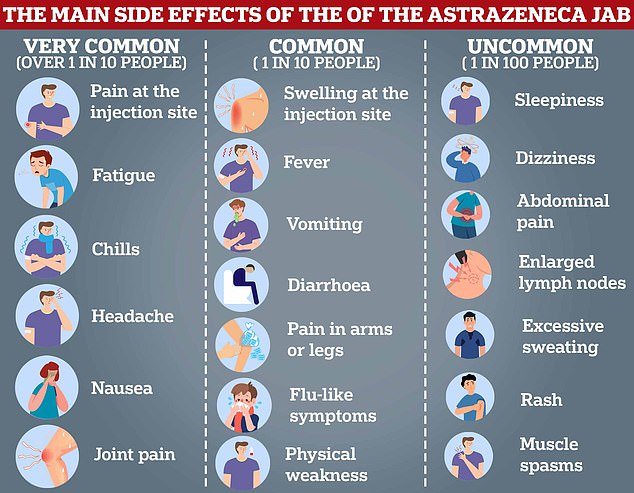
Kate says: ‘We’ve been talking a lot about it recently and he told me: ‘I feel so unconfident in everything in my life.’ His biggest fear is he can’t provide for his family now.’
Their sons, in turn, have had to cope with a father profoundly changed from the one they knew. ‘Our eldest watched daddy walk down the stairs three years ago then not come home for 125 days – and when he did come home, he was different,’ she says.
‘He is so kind and empathetic, but it confuses him. The youngest was just a baby, but if he’s separated from either of us, he’s frightened that something’s going to happen, and it must be innate from what happened.’
None of this means Kate isn’t incredibly grateful for Jamie’s survival – more than once, she describes them as ‘the luckiest of unlucky people’.
‘Every day I am filled with profound gratitude that he is alive.’
That gratitude, however, is matched by her anger at the injustice she feels has been meted out to vaccine victims, so often subject to stigma.
‘I’ve tried to be compassionate about it,’ she says of people’s discomfort. ‘I think it’s because Covid touched everyone. But it angers me that even now I have to say we’re not anti-vaccine. You can say the vaccine rollout saved lives while also saying lives were damaged, both things can be true. But people seem to struggle to accept that.’
She hopes the inquiry will help with this disconnect.
‘We want a legacy for those who died or have been injured so that, with any vaccine rollout programmes in the future, whatever they are, we know that if someone suffers they won’t have to go through this and there will be a fair and adequate compensation scheme.’
To that end, along with other victims she has also met with Health Secretary Wes Streeting, who has since written to Kate informing her he has commissioned officials to look into options to reform the current compensation scheme and ‘potential legislative change’.
‘I am grateful that he has done what he has said he will do so far and, in my latest reply to him, we’ve asked for an update from Easter,’ she says.
Last week, it emerged that the payment scheme has cost taxpayers more to run than it has paid out to victims – a key reminder, says Kate, that urgent reform is needed.
‘The fact they are paying more money in administration and rejecting victims than they are in compensation itself tells you how they are putting money in the wrong place,’ she says.
Nothing is likely to happen quickly, of course, and there are parallels with the Post Office scandal, which saw innocent victims fighting a government machine for compensation but also, perhaps equally crucially, for some official recognition of what they had been through.
It’s a sentiment Kate recognises only too well. ‘I think Jamie would like someone in authority to say: ‘Sorry this happened to you.’ Sorry – a small word but a very powerful one.’










